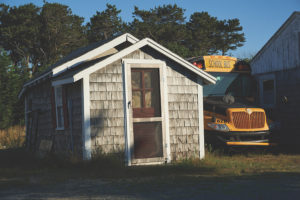For Jen Rhodes of Wellfleet, it was obvious where her eighth-grade son, Jack, should attend high school in the fall. She’d sent two daughters to technical schools, and knew that it made financial sense — so Cape Cod Regional Technical High School in Harwich seemed the logical choice.

But it wasn’t as apparent to Jack, who was aware of the stigma around vocational training and felt peer pressure to choose the more traditional education at Nauset Regional High School in North Eastham.
For Outer Cape eighth graders like Jack Rhodes, the decision of where to go to high school looms large. Familial and community connections, finances, higher education plans, and navigating stigma and stereotype are all possible considerations for different families.
Covid-19 has elevated the importance of one factor in particular: money. The pandemic has left many families in a tricky financial situation, making the high cost of college more daunting. A high school that offers a direct pipeline into the workforce has newfound appeal, and Cape Tech fits that description.
“The cost of college education and the lack of jobs afterward has opened some parents’ eyes,” said Billy Terranova, the principal of Cape Tech. “They’re saying, ‘Maybe college isn’t the best path for my child, and maybe we should look at some other options.’ That’s what Cape Tech offers.”
The school is required to track its graduates’ success, and has reported that Cape Tech alumni have an unemployment rate of under one percent — more than 99 percent either have a job, have joined the military, or are enrolled in higher education.
Cape Tech was not the first choice of Deaunte McLean, who lives in Provincetown. His mother decided to send him there, knowing that the combination of academics and learning a trade would benefit him later. “And,” he said, “you can’t really argue with Mom.”
McLean, who studied health technology at Cape Tech, is now reaping the benefits of his mother’s decision, explaining that “most of my friends [who went to Nauset] don’t have jobs, and I’m making more than the ones who do.”
Even before Covid-19 led to 20 consecutive weeks of a million-plus Americans filing for unemployment, Rhodes, weighing her son’s options, admired what Cape Tech offered for students and the greater Cape community.
“What Cape Tech is providing is huge,” she said. “There’s a shortage of skilled people in the trades, and jobs are going unfilled. It’s vitally important to keep young people here. The Cape doesn’t survive unless young people stay.”
A dramatically different set of considerations draws students to Nauset High. It is a part of the larger Nauset Regional School District, which includes the elementary schools in Brewster, Orleans, Eastham, and Wellfleet, and the Nauset Regional Middle School in Orleans. To many students at Nauset Middle — who’ve been wearing black and gold already for three years — going to Nauset High seems a natural transition.
“I always knew I wanted to go to Nauset High,” said Casey Powers of Wellfleet, a rising eighth grader at Nauset Middle. He is an enthusiastic math student and a saxophone player, and these strengths line up with his future high school’s strong academic reputation and its acclaimed music program. “People have said Tech isn’t smart, but I don’t think that’s true,” said Powers.
After a few months of online school this spring, Powers told the Independent, “I realized I’m really lucky to be going to Nauset.”
Another contributing factor? Many future Nauset high schoolers have older siblings, parents, and family friends that are connected to the school.
“It was never really a thought not to go to Nauset,” said Ella Mae Dixon, a rising senior there. “My dad went to Nauset, my family friends went to Nauset, my uncles went to Nauset, I had older friends who were at Nauset when I was in eighth grade.”
This logic can be frustrating for students who are considering options outside the Nauset pipeline. Some kids see choosing a school other than Nauset as a social sacrifice. Kayla Burrell, who finished her first year of Cape Tech in June, said that choosing to attend the Tech “was definitely a difficult decision, because all my friends were at Nauset.”
This was also a source of Jack Rhodes’s hesitation about going to Cape Tech. His mother described technical school students as “having to leave their friends” and said that comments like “Come to Nauset, that’s where we are all going to be” were prevalent.
One last hurdle complicates the high school decision: stereotypes about the population of each school. The assumptions about Nauset often have to do with wealth or social status.
“If you go there, a lot of people assume you’re well off,” Burrell said. “It’s looked at as a school where the popular kids go, or where you go if you’re wealthy.”
Stereotyping of Cape Tech students is more often about academic ability and behavior. Students there take a more hands-on approach to learning — mixing shop programs with academic classes — and some write them off as less intelligent or capable than their Nauset High peers.
So, each year, eighth graders up and down the Outer Cape weigh these factors in choosing where they’ll spend their next four years, in what might be the first big decision of their semi-adult lives. Now, of course, Outer Cape ninth graders might be attending their first day of high school from their bedrooms. The fall sports season will start Sept. 14, if at all. They might wear masks in math class. Their weekly schedule may be constant, but the national reality almost certainly won’t.
The class of 2024 poured time, effort, and perhaps agony into asking themselves two questions: “Where do I want to go to high school? Why do I want to go to this high school?”
Now, they must ask themselves something entirely different: What does high school even look like?



